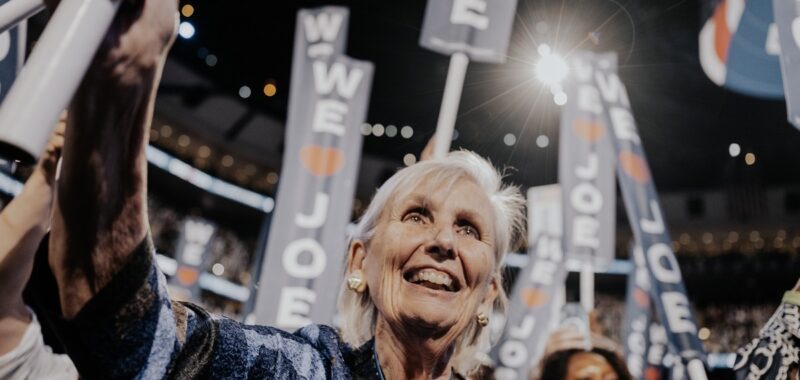
Produced by ElevenLabs and News Over Audio (NOA) using AI narration.
As Cory Booker gaveled out the third night of the Democratic National Convention, he told the delegates that he wanted to pose for a selfie from the podium. But before he went ahead with the photo, he had to ritually close the proceedings. “All those in favor say ‘Aye,’’’ he bellowed. Then more playfully, he channeled Semisonic. “Folks, it’s closing time. I don’t care where you go, but you can’t stay here.” Convention is a word generally associated with dutiful tedium, so why the rampant joy at this one?
The question is almost too obvious. At the very last minute, the Democratic Party escaped a brush with electoral cataclysm; it has witnessed the fairy-tale flourishing of an underestimated candidate, who has calmed long-simmering factional fights and imposed competence on a fumbling organization.
But there’s another, deeper reason that the past month has generated such an ecstatic outpouring. This chapter of the campaign has validated a tenet of liberalism that Democrats had begun to doubt and were on the cusp of discarding. Kamala Harris has helped to salvage a belief in institutionalism, thereby rescuing Democrats from an identity crisis.
At the beginning of the Donald Trump era, that belief acquired the trappings of theology. Liberals believed that norms and institutions were the only bulwark against Trump’s dictatorial tendencies, and they fretted that he would trash them, and turn the government into an extension of his will. Democrats extolled bureaucrats, judges, and journalists, the disinterested denizens of the establishment, who they hoped would prevent democracy from dying in the darkness.
Their valorization of institutions was partly a product of their ideology. The beneficence of government is the central idea of the modern Democratic Party. And it also has its roots in sociology. Liberal meritocrats at the apex of the party have spent their careers ascending American institutions. Because institutions have been good to them, they are inclined to believe in their virtue.
Over the past eight years, however, liberals began to question this faith. A darker, more Hobbesian view of politics took hold. If Republicans were engaged in a ruthless contest for power without respect for the constitutional order, they asked, then why should Democrats maintain their own fastidious adherence to the outmoded etiquette of Washington? By preaching and practicing institutionalism, Democrats were tying their own hands and dooming themselves to defeat. Forestalling a democratic emergency, some began to argue, required ditching rules that they once fetishized. Democrats began to embrace the previously unimaginable: abolishing the filibuster, installing Supreme Court term limits, and scrapping objectivity as the guiding aspiration of the media.
After Joe Biden’s flailing debate performance, the Democratic Party began to doubt its own institutional competence. The party seemed incapable of acting in its own clear interests. It couldn’t push aside an elderly president clinging to power, despite his blatant inability to effectively campaign. The Democratic elite looked as impotent as every other part of the American system, in which they had naively believed.
Then the unexpected happened. Elites quietly and effectively mobilized to replace Biden. And although much of the commentariat doubted the wisdom of installing Harris as his replacement, her initial performance has validated the party’s choice. For once, an institution awoke from its slumber and exceeded the public’s dim expectations. It didn’t just infuse Democrats with belief in their ability to defeat Donald Trump; it seems to have infused them with a renewed faith in their own party, a revival on display in their convention.
Where Republicans gathered in Milwaukee to genuflect before a leader, the Democrats in Chicago celebrated an apparatus. Instead of scrapping the traditions of the convention—which every pundit acknowledges to be a kludgy vestige of a bygone era—the Democrats have chosen to honor the old norms. That’s what made the DJ-led roll call of the states so endearing. Democrats were playfully adhering to an old ritual with genuine feeling, a loving nod to tradition. That approach extended to the speakers’ list. Whereas Republicans sought to erase the fact that their party has a heritage—with no history predating Trump’s descent down the escalator—the Democrats have honored their elders with prime-time slots.
On Wednesday, Pete Buttigieg, as normie an institutionalist as they come, gave a speech encapsulating the revived faith. He urged Democrats to choose “a better politics.” He was implying that Democrats no longer need to feel compelled to mimic the brutal power-hungry tactics of their opponents—that they can reclaim the old habits of persuasion and consensus building, become avatars of political virtue. After sitting in the darkness, stuck in a mode of outrage and desperate defense, this was the moment to mount an affirmative, celebratory case for institutions.
Of course, at some level, the Democrats were just trading excessive cynicism for overwrought optimism. But many of them seized the chance to switch from an episode of House of Cards and bathe, once more, in the strings of the West Wing theme. It’s Sorkin again in America.

